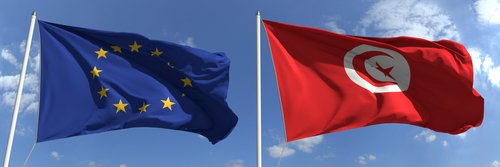Belgium (Brussels Morning Newspaper), In recent years, the European Union’s financial engagements abroad have increasingly come under scrutiny, a reflection of a broader debate about the balance between geopolitical interests and the union’s avowed commitment to democracy and human rights. A particularly contentious point of discussion has been the EU’s financial support to Tunisia.
This North African country, heralded as the birthplace of the Arab Spring, has seen its democratic gains perilously erode under the regime of President Kais Saied. The controversy reached a new zenith with the European Parliament’s stark opposition to the “Tunisia deal,” a financial arrangement that saw the European Commission transfer approximately 150 million euros to Tunisian authorities in early March. This deal, aimed ostensibly at curbing migration from Tunisia to Europe, has ignited a debate about the ethical implications of funding regimes accused of significant human rights violations and autocratic tendencies.
The “Tunisia deal” emerged from the EU’s strategic imperatives to manage migration flows from North Africa, a region rife with political instability and economic challenges. Agreed upon last summer, the deal represents a continuation of Europe’s pragmatic approach to migration, which often involves financial agreements with countries of origin or transit. However, the deal quickly became a lightning rod for criticism within the European Parliament, where many view it as a tacit endorsement of President Saied’s increasingly authoritarian rule.
Since Saied consolidated power in the summer of 2021, when he sidelined the parliament and prime minister to assume executive authority, concerns have been mounting about Tunisia’s democratic backsliding. Despite these developments, the EU’s financial commitment to Tunisia has not waned, reflecting a potentially troubling disjunction between the Union’s democratic ideals and its geopolitical actions.
Central to the debate in the European Parliament were the human rights abuses reportedly perpetrated by Saied’s regime. These include a pattern of harassment and arbitrary detention targeting journalists, lawyers, human rights activists, and political opponents — actions that starkly contravene the principles of freedom of expression and judicial independence. Additionally, reports of black migrants being abandoned in desert areas without essential supplies highlight a grave humanitarian concern. Such violations have prompted Members of the European Parliament (MEPs) to question whether the EU’s financial support to Tunisia indirectly contributes to sustaining an oppressive regime, undermining the Union’s credibility on human rights.
Since the Tunisian revolution of 2011, the EU has provided Tunisia with over 3.4 billion euros, a substantial portion of which has been in the form of grants and concessional loans. This financial support was initially seen as a way to bolster the fragile democracy emerging in Tunisia. However, the scale of the aid, particularly in budget support, has raised questions about the efficacy and ethical implications of such assistance. While 60 percent of the 2 billion euros in grants were allocated to budget support, the remaining funds were designated for democracy promotion and economic development. The increasing financial aid, especially against the backdrop of Saied’s authoritarian measures, suggests a complex relationship where European funds may inadvertently strengthen an undemocratic regime.
Critics, including Tunisian civil society leaders like Moez Ali, argue that the EU’s strategy may be counterproductive. Ali’s observations about Saied’s unpredictable behavior and reluctance to engage with European representatives underscore a broader issue of mutual distrust and misalignment of objectives. The EU’s historical pattern of concluding trade agreements that primarily benefit European interests has also contributed to skepticism about its intentions in Tunisia. The recent reluctance to alter the privileged partnership, even as Tunisia’s democratic transition was abruptly halted, further complicates the narrative, raising doubts about the effectiveness of EU policies in promoting human rights and democracy.
The EU’s financial support to Tunisia comes amid significant economic and social challenges within the country. The concentration of economic power in the hands of a few families, widespread corruption, and an unsustainable debt burden are symptomatic of deeper structural issues. These problems are exacerbated by EU policies that some argue prioritize European interests over Tunisian economic autonomy. The resulting economic pressures have led to tangible hardships for Tunisian citizens, including shortages of essential goods. This situation calls into question the long-term viability of the EU’s approach, which, according to critics, perpetuates an economic model that stifles Tunisia’s development and sovereignty.
The EU’s financial relationship with Tunisia encapsulates the broader dilemmas facing European foreign policy: how to reconcile strategic interests with the promotion of democracy and human rights. The controversy surrounding the Tunisia deal highlights the need for a critical reassessment of how financial aid is structured and the conditions attached to it. As the European Parliament’s opposition suggests, future agreements must be more closely aligned with the EU’s foundational values. Ensuring transparency, accountability, and adherence to democratic principles in partner countries should be paramount, lest the Union’s financial support inadvertently undermines the very ideals it seeks to promote.
Opinions expressed in the op-ed section are solely those of the individual author and do not represent the official stance of our newspaper. We believe in providing a platform for a wide range of voices and perspectives, even those that may challenge or differ from our own. As always, we remain committed to providing our readers with high-quality, fair, and balanced journalism. Thank you for your continued support.Sincerely, The Brussels Morning Team




